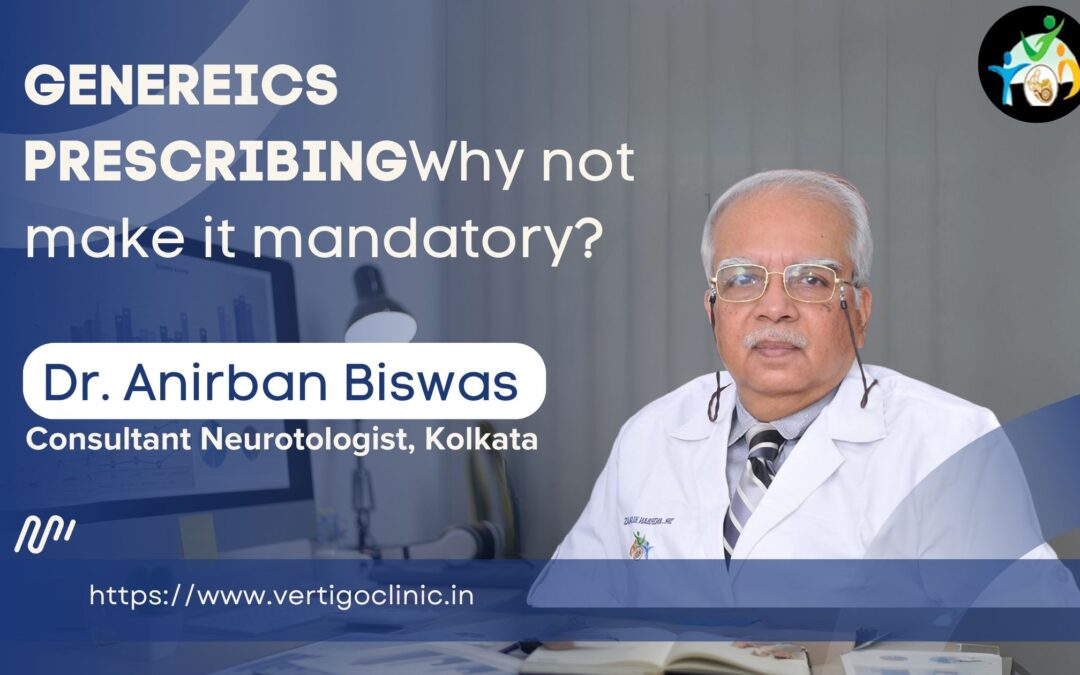When a patient visit a doctor, the patient rightly presumes that the ‘doctor will look after my best interests’ and this behooves the doctor’s ensuring that, the patient not only gets the best therapeutic outcome, feasible, but gets a standard medicinal product (s) that meets all purity efficacy parameters at the least price payable
Dr. Anirban Biswas
Consultant Neurotologist, Kolkata
The second duty of the doctor acquires much more significance in a country like india as most patients have monetary constraints and huge subset of patients are not covered by medical insurance. So most patients have to pay for price of the medicines for their own pockets curtailing other equally (if not, more) Important necessities. Even if some insurance company pays for the patients medication, the too it is incumbent on the doctor to safeguard the insurance companies interests as well. The medical industry wors on trust, and even when an insurance company reimburses a patient’s medicine costs, it does so on the assumption that the doctor has not sacrificed the insurance company’s interest and has prescribed the most effective drug (s) at the cheapest price available.
However, this is not what happens in reality. Most doctors are not aware that there is very discrepancy in the price at which medicines are sold. The same medicine is sold by different companies at very widely varying prices. Let’s take the example of a pharmaceutical product ‘betahistine hydrochloride‘. The drug is marketed by numerous (more than 150) pharma companies in india. Below is given the printed retail price (MRP) of 7 of the top selling brands betahistine in india. The below table shows that the same pharmaceutical product is sold at 1/3 the price by another equally, if not more renowned pharma company. So, if a costly brand is prescribed, the patient loses nearly Rs.20 per tab. that transpire to Rs 60 per day, Rs 1800 per month and Rs 10,800 continued for 6 months. It is the prescribing clinicians’ prerogative to ensure that the patient is not made to pay extra for the product which the patient could have to got at a much lesser price.

In fact, the same pharmaceutical product of the same strength is also available at much cheaper rates than those shown here. Generic formulations of this same medicine (24gm betahistine) available at prices as low as Rs3.40 per tablet (11% of the costliest brand) whereas the costly brand are sold in the price range of Rs 25 to 31.
Today, Patients with access to all information have become suspicious of the healthcare system and the sad outcome of this is a loss of trust on the doctor who is the face of the system, even though he is merely being used as a facilitator in the warped system of unscrupulously profiteering by some commercial organisations. It is high time that prescription of generics for all medicines that have crossed the ‘period of patent’ become mandatory. This is not impossible to achieve if the regulatory bodies like the ethics and medical Registration Board, different state and national medical councils, the drug control dept. and of course The Central Drugs Standard Control Organisation (CDSCO), act pro-actively and enhance surveillance. Any form of non-compliance like manufacturing/marketing of standard medicines and not prescribing generics for all off-patent drugs must be strongly penalized. The Prescription must be in generic name and iff the patient opts to buy the same pharmaceutical products at an astronomical sum, the patient may be free to do so but should never be forced to do so by the prescriber. All medicines need to have an upper price limit (not exceeding triple the price of the active pharmaceutical ingredient) fixed by the regulatory authorities. Implementation of this is possible only through the legal route.

